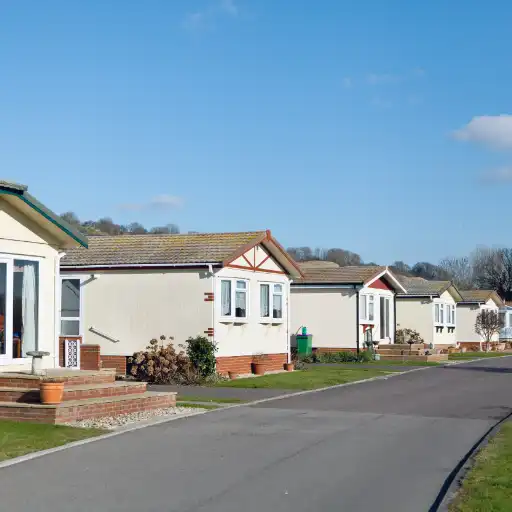Park Home Insurance

We've been providing park home insurance policies as your local broker for over 30 years.
Since 1993 Howden Insurance have been providing park home insurance policies to communities across the UK as a local insurance broker.
To achieve this, we work with specialist park home insurers across the industry and compare policy options on our clients' behalf, based on what they tell us they expect to get from their cover. Regardless of the park home you need to insure, and whatever budget your is, we'll do everything we can to help you get your hands on a comprehensive policy.
Our team acknowledge that each policy needs to be as individual as its owner and their park home, and that’s why we provide a bespoke, personalised service, which focuses on getting to know you and finding out exactly what you want from your cover.
To get a quote, you can either give us a call, submit a call-back request on our website, or visit us in your local Howden branch.
What does park home insurance cover?
- Protection in the event of adverse weather or floods.
- Contents if they are lost, stolen or damaged.
- Against vandalism or malicious damage.
- Compensation claims or any legal costs you take on following a third-party claim.
- Agreed amounts for you to stay in temporary accommodation, if needed.
- For damage caused by fires.
What is park home insurance?
A park home insurance policy is a specialist type of cover for park home owners who reside in their park home as their main residence. These homes are different from standard brick-and-mortar houses, so they require specific coverage tailored to their unique structure and living environment.
You can get a park home insurance quote with us and expect to receive the same perks that come with insuring a typical home, but under a specialist cover.
Read more here: What is Park Home Insurance?
What is a park home?
You might’ve heard park homes being referred to as ‘mobile homes’, as they have been previously known. Over 85,000 people live in park homes across the UK as their main residence.
Park homes are typically single storey, detached residential properties found in a gated community or a protected site of land which is privately owned.
Do I need park home insurance?
No, having a park home insurance policy is not compulsory. However, we do highly recommended that you get your park home insured to cover yourself against any damages, theft, or accidents which could leave you out-of-pocket. Ultimately, it’s similar to standard home insurance in that it’ll cover you in the event that your investment faces financial hardship.
Without park home cover, you risk being left responsible for replacing or making emergency repairs on your park home if it gets damaged.
What does a park home insurance policy include?
Here’s an overview of things that you could expect to be covered and included within your park home insurance policy:
- Extended accidental damage cover is sometimes included at no extra cost for your park home structure. Contents cover and Personal Possessions cover is also sometimes included at no extra cost.
- Public liability insurance is usually provided at a minimum sum insured of £5 million. This covers you in the event of a claim from a third party for injury or damage to their property which you’re negligent for.
- Fire damage, theft or attempted theft, vandalism, escape of water or oil, impact by vehicles or animals, subsidence and storm damage are usually covered as insured events you can claim for under your park home insurance policy.
- Flood cover will be either included or excluded under your park home insurance policy, depending on the insurer’s assessment of flood risks and how close the park home is to bodies of water.
- Temporary alternative accommodation is available in the event of an insured claim where you’re unable to live in your home, for example a fire or flood claim. Specialised home emergency cover could also be added to your policy.
- Legal expenses cover for a park home owner may or may not be included within your insurance policy. If legal costs aren't covered then it’s usually an optional cover which is available for you to purchase for an additional premium.
Park home insurance cover is arranged on a New for Old basis, so long as the age of the park home is under 40 years old, though this could differ if you renew each year.
This means that, in the event of an insured claim under your policy, such as a fire or flood where your insurer classes your property as beyond economical to repair, it’ll be replaced with a brand-new equivalent make and model from your manufacturer. You should therefore insure your park home for this price, rather than the price that you’d sell your property at.
How much does park home insurance cost?
On average, in the UK, park home owners can expect to pay between £100 and £400 to cover your property comprehensively. This can vary though, and it’s hard to put a finger on exactly how much your park home insurance will cost, because it’ll depend on a variety of factors. These factors might include:
- Its age
- Its size
- Its value
- Where it's located
- Which / how many safety devices are installed
- The park homeowner's claims history
Each of the park home insurance specialists we work with is different too, so insurance premiums on will vary across the market.
How can I reduce the cost of my park home insurance premium?
There are several ways you can reduce the cost of your park home insurance premiums, including:
- Looking after your park home and inspecting it regularly – keeping on top of any wear and tear reduces the likelihood that you’ll need to make a claim in the future.
- Considering where you buy your park home – insurers tend to raise their premiums if they deem the area where your park home is based to be high risk and less secure. For example, if the park home is in an area where risk of flooding is high, general and flood cover premiums could be raised.
- Seeking out discounts – as an insurance broker we’ll always aim to get you the best price for your insurance, but you can always also ask if you can benefit from any policy discounts. Paying for your entire policy upfront, instead of monthly, will also make your insurance cheaper.
- Getting multiple policies – you may even save money on other policies if you purchase park home insurance. Some insurers will discount the prices of other policies if they know you have already bought park home insurance with them.
Whilst we understand how much the cost of your policy will be to you, it's important to remember that the cheapest insurance isn't always the best insurance. Because after all, getting a comprehensive policy that can keep you secure and fully-protected could save you money in the event of an accident or incident that occurs unexpectedly.
How can I get a quote?
Getting a park home insurance quote doesn’t need to be complicated. All you need to do is provide us with the following information:
- Your personal details
- The make, model and the year the park home was made
- Your park home's site address
- The price you need to insure your park home for on a new for old or a market value basis
- Your claims history
- Information on major events on your caravan site such as previous flooding and proximity to bodies of water
If you wish to include any cover for your caravan contents such as decking or veranda, we can help you with that. All you need to do is find out the cost to replace these contents, either brand new or on a market value basis, depending on whether you’re insuring the structure of your park home on a New for Old or a Market Value basis.

Hear from our insurance expert…
What's one thing I should consider before taking out a park home insurance policy?
"If your park home or mobile home is used as your main residence, you need to ensure that the insurance policy you take out covers you for temporary alternative accommodation, should the worst happen like a fire, or flood claim, which renders your property uninhabitable."
Rachel Cook, park home and caravan insurance expert.

Rated 'Excellent' on Trustpilot

500,000+ Protected Clients

Insuring for 30+ years

Insurance Broker of the decade
FAQs about park homes
How long can I leave my park home unoccupied?
Typically, if your park home is left unoccupied for 30 consecutive days throughout a policy year, you'll need to inform your insurer.
All park home insurance policies will have an unoccupancy period written into its policy booklet. Once you exceed the time that your insurance provider allows then they’ll either impose the terms and restrictions in their cover, require you to pay an additional premium, or be unable to cover you under their policy.
Speaking to an insurance broker about any known unoccupancy periods for planned events like holidays etc, ensures that you receive the right advice on which policy suits your needs and will give you clarity about what terms, or policy cover restrictions will apply.
Can I live permanently in a park home?
Yes, you can live in a park home all year round.
Residential park homes can last around 80 years, or even longer if kept in good condition. They also often comply with modern building regulations, making them suitable for permenant living.
Can you get a mortgage on a park home?
Generally speaking, no, you can't get a mortgage on a residential park home.
Buying a park home is different to buying a traditional home. When you buy a traditional home you then own the land the property sits one. Whereas, when buying a park home, you only own the home and the site owner owns the land the park home sits on. In this scenario, a lender is more at risk in the event that the park owner's land lease runs out.
Do you pay council tax on a park home?
If your park home is your main residence, the yes, you’ll have to pay council tax.
Otherwise, if you're using your park home for holiday use, paying council tax isn't necessary.
Can I pay for park home insurance in instalments?
Yes, you can pay for your park home insurance in instalments.
It’s dependent on the insurer, but if paying for a full 12-month months policy right away would be out of your budget, you can opt to pay in monthly instalments instead.
Is a park home classed as property?
Yes, park homes can be classed as properties, but they differ from what's traditional.
Whilst park home residents do own the properties themselves, they do not own the ground they sit on. Instead, owners of park homes typically have to rent the land from a site owner.
Read more here: Is a park home classed as a property?
How long do park homes last?
Park homes are known to last as long as 80 years, but on average they tend to last between 40 and 70 years.
Naturally, the better kept the park home is, the more likely it is that it'll last longer. The great thing about park homes is, if it does become worn, parts are easy to replace, which can make it last even longer.
Do park homes go up in value?
It is rare that a park home will go up in value - but if well-maintained, they can they can hold their value for longer. Park homes are generally sold at a lower price compared traditional home because of how they can depreciate in value over time.
Park home value can depend on its age, its location, and its condition.
Do you need planning permission for a park home?
Usually, if your park home is sited in your garden, you are not required to get planning permission. Otherwise, you'll need to contact your local council for approval before siting a park home.
Are park homes cold in winter?
Most modern-day park homes are equipped and designed to retain heat, keeping them warm throughout the winter.
Some efficient heating features and systems found in park homes include under-floor heating and double glazing windows, whereas some park homeowners opt to equip their properties with new boilers of advanced insulation materials to prevent to maintain warm temperatures.
Do I need a solicitor to buy a park home?
No, you are not necessarily required to involve a solicitor when buying a park home.
However, if you choose not to inform a solicitor of your purchase, you run the risk of being vulnerable to any legal complications that come with purchasing a park home. Sometimes things go wrong, so it's good to have the support of a solicitor so that you remain protected.
Read more here: Buying a Park Home: A comprehensive guide
Do you pay stamp duty on park homes?
No, you are not required to pay stamp duty when buying a park home.
Stamp duty is a tax on the land that's being purchased, and because when you buy a park home you are not actually buying the land that the home sits on, you are therefore not expected to pay stamp duty.
What are the pitfalls of buying a park home?
Some of the pitfalls that come with buying a park home include:
- Value depreciation
- Smaller living spaces
- Restrictions around modifications
- Potential for additional fees
You can find out more about what you need to know when buying a park home in our guide: Are park homes a good investment?
Why choose Howden for park home insurance?
Thanks to the great relationships we have with our selected panel of specialist and standard insurers, we make the process of comparing multiple park home policies, on your behalf, simple and straightforward. In fact, when it comes to getting park home insurance cover, we at Howden pride ourselves on doing the heavy lifting, so you don’t have to.
We provide a personalised and tailor-made service, because we know that each park home policy needs to be as individual as its owner. Our goal is to focus on getting to know you and finding out exactly what you want from your park home insurance.
All in all, whether you need to make a claim, purchase a new park home policy or renew an existing one, just know that we’re here to help.
How much do park homes cost in the UK?
How much a park home is worth will depend on its size, what model it is, where its located, and how old it is. However, in the UK, we do know that park home prices can range from £150,000 to £350,000.
What rights do I have as a park home owner?
Park home owners in the UK have various rights. These include the right to:
- Live in their park home all year round
- Gift their park home to a friend of family member
- Sell their park home on the open market
- Challenge unfair fees or and remain protected from unfair evictions
However, with rights, also come certain obligations. Park home owners are obligated to do the following things:
- Abide by the rules of the park home site
- Pay a pitch fee
- Maintain their property
To find out more about the rights an obligations of park home owners, you can visit UK Government's Park Home Owners: Your rights and obligations page.
More resources
Latest park home guides
Want to learn more about park homes? Read one of our park home insurance guides or any of the articles below, which you can find on the Howden Blog!
Other caravan-related guides
We're not just specialists in park homes! Read more from us about different types of leisure accommodation and the policies which cover them:
- Does a Caravan Need an MOT?
- Can you park a caravan on the road?
- Top Ten Caravan Towing Cars
- Is caravan insurance a legal requirement?
- What does caravan insurance cover?
- How much is caravan insurance?
- Do you need insurance to tow a caravan?
- A guide to camping and caravan insurance
- The road ahead for VW insurance
- Does caravan insurance cover water leaks?
- How should you load your trailer? Your guide
- What is motor legal protection?
- How to fix caravan damp wall damage
- Can you park a caravan on the road?
- Are passengers allowed to ride in a caravan that’s being towed?
- What is the speed limit for a car towing a caravan?
- Is buying a caravan worth the cost?
- Caravanning in winter: embrace the adventure
- Alarming rise in caravan and campervan theft
Campervans
- Do I need to register my van as a campervan?
- Is campervan insurance cheaper than van insurance?
- What insurance do I need to rent out my campervan?
- How Much is Campervan Insurance in The UK?
- Do you need specialist insurance for a campervan?
- Campervan vs motorhome: what is the difference?
Motorhomes
Static caravans
- Do you pay council tax on a static caravan?
- What do I need to get a static caravan insurance quote?
- What does static caravan insurance cover?
- What is static caravan insurance?
- New for old static caravan insurance explained
- Can you live in a static caravan? A practical guide
- How much does a static caravan cost?
Trailer tent and towing
Caravan Insurance
Tailor-made insurance for your caravan
Whether you have a static caravan or a touring caravan, let us, a reliable insurance broker, help you get the cover you need for your home away from home.
Static Caravan Insurance
Static Caravan Insurance as desirable as your holiday home
Be prepared for the unexpected and protect your 'home away from home' with tailored static caravan insurance.
Touring Caravan Insurance
Tow in style, with Touring Caravan Insurance
Make sure your towed property is protected while you’re on the road with fully comprehensive touring caravan insurance.
Mobile home insurance
Trust industry experts with your mobile home cover
Protect your home-away-from-home with comprehensive mobile home insurance.
Motorhome Insurance
Keep you and your home on wheels protected
Sleep easier when you’re enjoying life on the road with comprehensive and specialist motorhome insurance.
Classic Campervan Insurance
Protect your classic home on wheels with classic campervan insurance.
This specialist type of insurance will take your campervan’s age, rarity, and condition into account.
Campervan Insurance
Specialist cover that keeps you and your camper safe on the road
Let us help you protect your campervan by sourcing you a quote that you can rely on.
Trailer Tent Insurance
Trailer Tent cover you can trust
Love your trailer tent, love our personal service. Our team of advisors can help find you the policy that’s right for your trailer tent.

